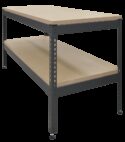Experiment
STS8

Pin-Jointed Frameworks (Next Generation Structures)
Experiment for the study of strains, stresses, forces and deflections in various pin jointed frameworks, and the study of Bow’s notation. Mounts on the Structures platform and connects to Structures automatic data acquisition unit and software.
If you have any questions or you'd like to discuss a product, please call us.
+44 1159 722 611Pin-Jointed Frameworks (Next Generation Structures)
One of a range of experiment modules that fit to the Structures platform (STS1, available separately), this
product helps students to understand the forces and deflections in four popular pin-jointed frameworks, due to a load. Students use a load cell to measure and add loads to each of a choice of four frameworks, held on supports. Strain gauges on each member of the framework measure the forces due to the load. A precision digital indicator measures the deflection of each framework.
Students apply the load and measure the resulting forces and defl ection. They use textbook equations to predict the forces and deflections for any given load, comparing them to measured results. This helps confirm the reliability of the textbook equations and the accuracy of the experiment results. An optional load cell (STS??) allows students to add a secondary load to the side of the roof truss. Each load cell can apply angled loads for additional experiments or to simulate a swaying load.
The strain gauges connect to a strain gauge amplifier, which connects (with the load cell) to the USB interface hub of the Structures platform for computer display and data acquisition.
Learning outcomes
• Introduction to Bow’s notation
• Strain gauges as instruments
• Forces and defl ections in diff erent frameworks
• The Warren truss
• The roof truss (or Howe/Pratt truss)
• Simple and advanced cantilever trusses
• Force analysis by method of joints and method of sections
• Deflection analysis by the strain-energy method
• Wind loads on a roof truss
• Effect of a swaying load on a cantilever truss
• The principle of superposition for multiple loads (needs additional load cell)












